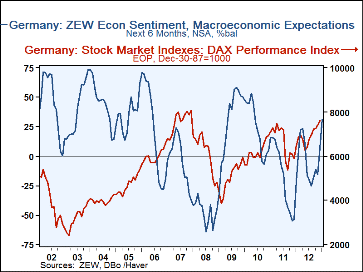 Global| Jan 22 2013
Global| Jan 22 2013Zew Expectations Surge!
Summary
The Zew index jumped in January in keeping with improved perceptions of conditions in the euro-Zone. German elections are still in train and a recent local loss of support for Merkel in Lower Saxony to the center-left may make her [...]
 The Zew index jumped in January in keeping with improved perceptions of conditions in the euro-Zone. German elections are still in train and a recent local loss of support for Merkel in Lower Saxony to the center-left may make her seem a bit more vulnerable. But by and large the view in Germany is that they have set a path and that their leader is controlling events in the Zone. The jump in the Zew index is in concert with all these perceptions whether they are real or not.
The Zew index jumped in January in keeping with improved perceptions of conditions in the euro-Zone. German elections are still in train and a recent local loss of support for Merkel in Lower Saxony to the center-left may make her seem a bit more vulnerable. But by and large the view in Germany is that they have set a path and that their leader is controlling events in the Zone. The jump in the Zew index is in concert with all these perceptions whether they are real or not.
The Zew current index improved alongside the jump in expectations with both indices currently residing at more similar relative positions in their respective historic queues. The current index is stronger 33% of the time; expectations are stronger 47% of the time. This is much closer than the 34%/71% split from last month. Expectations have been making up ground very rapidly.
Even the Bundesbank is getting more upbeat as it expects the German economic slowdown to be short-lived. In early December it had just trimmed its growth outlook to 0.4% for 2013 from 1.6% previously.
The chart shows that since roughly 2006 the Zew expectations index has been an important harbinger of the German equity market. To that extent, the ongoing lift to expectations is a positive signal to the equity market. But since it is the German financial professionals that contribute to the Zew index we may actually be picking up the biases of this group. Prior to 2006 the Zew-Dax relationship was not so tight.
The rating for stocks in January has climbed to +5.1 (net balance) its highest reading since August of 2011. The bond market rating is still decidedly negative at -8.2. At that level it was last worse in July of 2012. These sector readings find the stock assessment weaker than its January assessment about 44% of the time; the bond assessment weaker only about 7% of the time. The German financial experts remain very cautious on the bond market; their outright equity preference is still guarded but is slightly above its historic mid-point rating; equities are clearly far preferred to bonds in this environment.
Growing optimism is reflected in the Zew experts' assessment of stock sectors as well. All thirteen surveyed sectors shows month-to-month improved assessments, that's up from 10 out of 13 last month and six out of thirteen the month before that. June of 2012 marks the point of pessimism in the sense that all sectors were downgraded month-to-month from their May readings in June of last year. Now, in January 2013, all sectors are upgraded. The average assessment is the best since May of 2012 just before the financial experts began to downgrade prospects on a broad front.
On balance there is a lot more optimism in EMU. But with the finance ministers just having met there continues to be conflict over the bailout facility. EMU and the IMF cannot come to terms over the difficult situation of Cyprus. With the German elections in train most of the hostilities in Europe have been dialed down. Germans and French are today celebrating half a century of postwar partnership. Let's not confuse the calm before the storm for actual tranquility.
Robert Brusca
AuthorMore in Author Profile »Robert A. Brusca is Chief Economist of Fact and Opinion Economics, a consulting firm he founded in Manhattan. He has been an economist on Wall Street for over 25 years. He has visited central banking and large institutional clients in over 30 countries in his career as an economist. Mr. Brusca was a Divisional Research Chief at the Federal Reserve Bank of NY (Chief of the International Financial markets Division), a Fed Watcher at Irving Trust and Chief Economist at Nikko Securities International. He is widely quoted and appears in various media. Mr. Brusca holds an MA and Ph.D. in economics from Michigan State University and a BA in Economics from the University of Michigan. His research pursues his strong interests in non aligned policy economics as well as international economics. FAO Economics’ research targets investors to assist them in making better investment decisions in stocks, bonds and in a variety of international assets. The company does not manage money and has no conflicts in giving economic advice.






